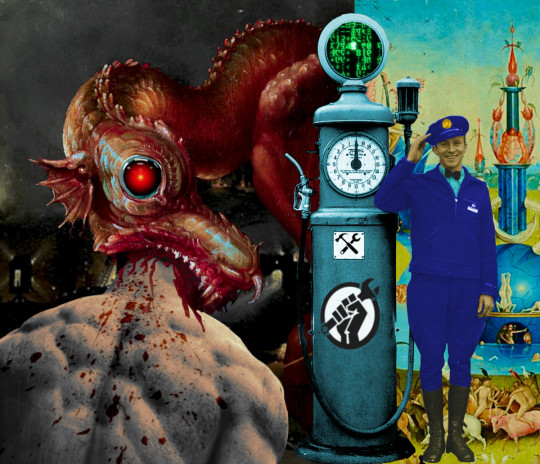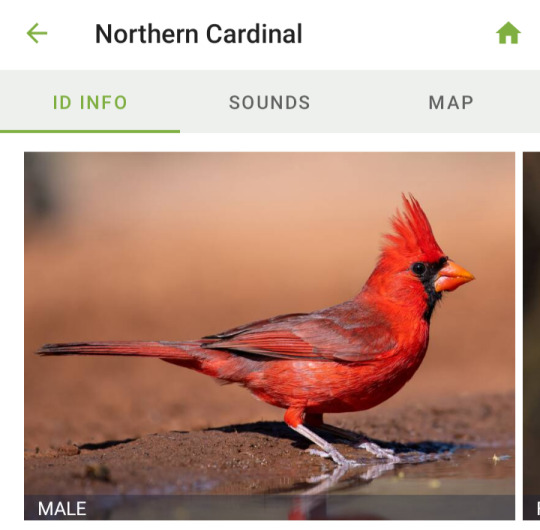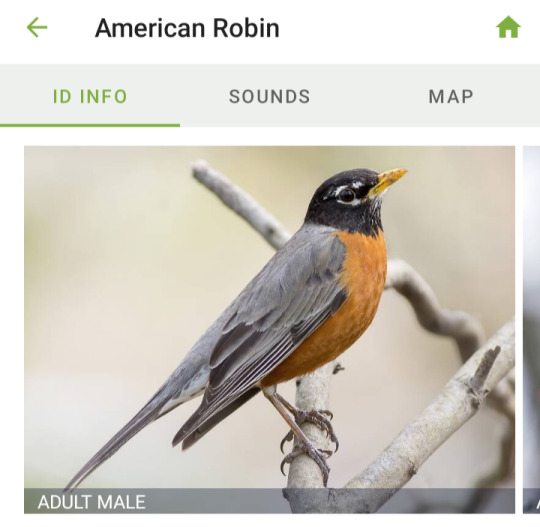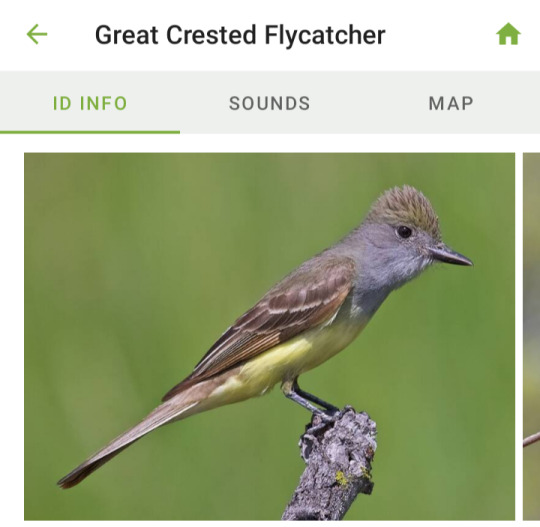#eucd
Explore tagged Tumblr posts
Text
Antiusurpation and the road to disenshittification

THIS WEEKEND (November 8-10), I'll be in TUCSON, AZ: I'm the GUEST OF HONOR at the TUSCON SCIENCE FICTION CONVENTION.

Nineties kids had a good reason to be excited about the internet's promise of disintermediation: the gatekeepers who controlled our access to culture, politics, and opportunity were crooked as hell, and besides, they sucked.
For a second there, we really did get a lot of disintermediation, which created a big, weird, diverse pluralistic space for all kinds of voices, ideas, identities, hobbies, businesses and movements. Lots of these were either deeply objectionable or really stupid, or both, but there was also so much cool stuff on the old, good internet.
Then, after about ten seconds of sheer joy, we got all-new gatekeepers, who were at least as bad, and even more powerful, than the old ones. The net became Tom Eastman's "Five giant websites, each filled with screenshots of the other four." Culture, politics, finance, news, and especially power have been gathered into the hands of unaccountable, greedy, and often cruel intermediaries.
Oh, also, we had an election.
This isn't an election post. I have many thoughts about the election, but they're still these big, unformed blobs of anger, fear and sorrow. Experience teaches me that the only way to get past this is to just let all that bad stuff sit for a while and offgas its most noxious compounds, so that I can handle it safely and figure out what to do with it.
While I wait that out, I'm just getting the job done. Chop wood, carry water. I've got a book to write, Enshittification, for Farar, Straus, Giroux's MCD Books, and it's very nearly done:
https://twitter.com/search?q=from%3Adoctorow+%23dailywords&src=typed_query&f=live
Compartmentalizing my anxieties and plowing that energy into productive work isn't necessarily the healthiest coping strategy, but it's not the worst, either. It's how I wrote nine books during the covid lockdowns.
And sometimes, when you're not staring directly at something, you get past the tunnel vision that makes it impossible to see its edges, fracture lines, and weak points.
So I'm working on the book. It's a book about platforms, because enshittification is a phenomenon that is most visible and toxic on platforms. Platforms are intermediaries, who connect buyers and sellers, creators and audiences, workers and employers, politicians and voters, activists and crowds, as well as families, communities, and would-be romantic partners.
There's a reason we keep reinventing these intermediaries: they're useful. Like, it's technically possible for a writer to also be their own editor, printer, distributor, promoter and sales-force:
https://pluralistic.net/2024/02/19/crad-kilodney-was-an-outlier/#intermediation
But without middlemen, those are the only writers we'll get. The set of all writers who have something to say that I want to read is much larger than the set of all writers who are capable of running their own publishing operation.
The problem isn't middlemen: the problem is powerful middlemen. When an intermediary gets powerful enough to usurp the relationship between the parties on either side of the transaction, everything turns to shit:
https://pluralistic.net/2022/06/12/direct-the-problem-of-middlemen/
A dating service that faces pressure from competition, regulation, interoperability and a committed workforce will try as hard as it can to help you find Your Person. A dating service that buys up all its competitors, cows its workforce, captures its regulators and harnesses IP law to block interoperators will redesign its service so that you keep paying forever, and never find love:
https://www.npr.org/sections/money/2024/02/13/1228749143/the-dating-app-paradox-why-dating-apps-may-be-worse-than-ever
Multiply this a millionfold, in every sector of our complex, high-tech world where we necessarily rely on skilled intermediaries to handle technical aspects of our lives that we can't – or shouldn't – manage ourselves. That world is beholden to predators who screw us and screw us and screw us, jacking up our rents:
https://www.thebignewsletter.com/p/yes-there-are-antitrust-voters-in
Cranking up the price of food:
https://pluralistic.net/2023/10/04/dont-let-your-meat-loaf/#meaty-beaty-big-and-bouncy
And everything else:
https://pluralistic.net/2023/11/06/attention-rents/#consumer-welfare-queens
(Maybe this is a post about the election after all?)
The difference between a helpmeet and a parasite is power. If we want to enjoy the benefits of intermediaries without the risks, we need policies that keep middlemen weak. That's the opposite of the system we have now.
Take interoperability and IP law. Interoperability (basically, plugging new things into existing things) is a really powerful check against powerful middlemen. If you rely on an ad-exchange to fund your newsgathering and they start ripping you off, then an interoperable system that lets you use a different exchange will not only end the rip off – it'll make it less likely to happen in the first place because the ad-tech platform will be afraid of losing your business:
https://www.eff.org/deeplinks/2023/05/save-news-we-must-shatter-ad-tech
Interoperability means that when a printer company gouges you on ink, you can buy cheap third party ink cartridges and escape their grasp forever:
https://www.eff.org/deeplinks/2020/11/ink-stained-wretches-battle-soul-digital-freedom-taking-place-inside-your-printer
Interoperability means that when Amazon rips off audiobook authors to the tune of $100m, those authors can pull their books from Amazon and sell them elsewhere and know that their listeners can move their libraries over to a different app:
https://pluralistic.net/2022/09/07/audible-exclusive/#audiblegate
But interoperability has been in retreat for 40 years, as IP law has expanded to criminalize otherwise normal activities, so that middlemen can use IP rights to protect themselves from their end-users and business customers:
https://locusmag.com/2020/09/cory-doctorow-ip/
That's what I mean when I say that "IP" is "any law that lets a business reach beyond its own walls and control the actions of its customers, competitors and critics."
For example, there's a pernicious law 1998 US law that I write about all the time, Section 1201 of the Digital Millennium Copyright Act, the "anticircumvention law." This is a law that felonizes tampering with copyright locks, even if you are the creator of the undelying work.
So Amazon – the owner of the monopoly audiobook platform Audible – puts a mandatory copyright lock around every audiobook they sell. I, as an author who writes, finances and narrates the audiobook, can't provide you, my customer, with a tool to remove that lock. If I do so, I face criminal sanctions: a five year prison sentence and a $500,000 fine for a first offense:
https://pluralistic.net/2022/07/25/can-you-hear-me-now/#acx-ripoff
In other words: if I let you take my own copyrighted work out of Amazon's app, I commit a felony, with penalties that are far stiffer than the penalties you would face if you were to simply pirate that audiobook. The penalties for you shoplifting the audiobook on CD at a truck-stop are lower than the penalties the author and publisher of the book would face if they simply gave you a tool to de-Amazon the file. Indeed, even if you hijacked the truck that delivered the CDs, you'd probably be looking at a shorter sentence.
This is a law that is purpose-built to encourage intermediaries to usurp the relationship between buyers and sellers, creators and audiences. It's a charter for parasitism and predation.
But as bad as that is, there's another aspect of DMCA 1201 that's even worse: the exemptions process.
You might have read recently about the Copyright Office "freeing the McFlurry" by granting a DMCA 1201 exemption for companies that want to reverse-engineer the error-codes from McDonald's finicky, unreliable frozen custard machines:
https://pluralistic.net/2024/10/28/mcbroken/#my-milkshake-brings-all-the-lawyers-to-the-yard
Under DMCA 1201, the Copyright Office hears petitions for these exemptions every three years. If they judge that anticircumvention law is interfering with some legitimate activity, the statute empowers them to grant an exemption.
When the DMCA passed in 1998 (and when the US Trade Rep pressured other world governments into passing nearly identical laws in the decades that followed), this exemptions process was billed as a "pressure valve" that would prevent abuses of anticircumvention law.
But this was a cynical trick. The way the law is structured, the Copyright Office can only grant "use" exemptions, but not "tools" exemptions. So if you are granted the right to move Audible audiobooks into a third-party app, you are personally required to figure out how to do that. You have to dump the machine code of the Audible app, decompile it, scan it for vulnerabilities, and bootstrap your own jailbreaking program to take Audible wrapper off the file.
No one is allowed to help you with this. You aren't allowed to discuss any of this publicly, or share a tool that you make with anyone else. Doing any of this is a potential felony.
In other words, DMCA 1201 gives intermediaries power over you, but bans you from asking an intermediary to help you escape another abusive middleman.
This is the exact opposite of how intermediary law should work. We should have rules that ban intermediaries from exercising undue power over the parties they serve, and we should have rules empowering intermediaries to erode the advantage of powerful intermediaries.
The fact that the Copyright Office grants you an exemption to anticircumvention law means nothing unless you can delegate that right to an intermediary who can exercise it on your behalf.
A world without publishing intermediaries is one in which the only writers who thrive are the ones capable of being publishers, too, and that's a tiny fraction of all the writers with something to say.
A world without interoperability intermediaries is one in which the only platform users who thrive are also skilled reverse-engineering ninja hackers – and that's an infinitesimal fraction of the platform users who would benefit from interoperabilty.
Let this be your north star in evaluating platform regulation proposals. Platform regulation should weaken intermediaries' powers over their users, and strengthen their power over other middlemen.
Put in this light, it's easy to see why the ill-informed calls to abolish Section 230 of the Communications Decency Act (which makes platform users, not platforms, responsible for most unlawful speech) are so misguided:
https://www.techdirt.com/2020/06/23/hello-youve-been-referred-here-because-youre-wrong-about-section-230-communications-decency-act/
If we require platforms to surveil all user speech and block anything that might violate any law, we give the largest, most powerful platforms a permanent advantage over smaller, better platforms, run by co-ops, hobbyists, nonprofits local governments, and startups. The big platforms have the capital to rig up massive, automated surveillance and censorship systems, and the only alternatives that can spring up have to be just as big and powerful as the Big Tech platforms we're so desperate to escape:
https://pluralistic.net/2024/03/23/evacuate-the-platforms/#let-the-platforms-burn
This is especially grave given the current political current, where fascist politicians are threatening platforms with brutal punishments for failing to censor disfavored political views.
Anyone who tells you that "it's only censorship when the government does it" is badly confused. It's only a First Amendment violation when the government does it, sure – but censorship has always relied on intermediaries. From the Inquisition to the Comics Code, government censors were only able to do their jobs because powerful middlemen, fearing state punishments, blocked anything that might cross the line, censoring far beyond the material actually prohibited by the law:
https://pluralistic.net/2024/02/22/self-censorship/#hugos
We live in a world of powerful, corrupt middlemen. From payments to real-estate, from job-search to romance, there's a legion of parasites masquerading as helpmeets, burying their greedy mouthparts into our tender flesh:
https://www.capitalisnt.com/episodes/visas-hidden-tax-on-americans
But intermediaries aren't the problem. You shouldn't have to stand up your own payment processor, or learn the ins and outs of real-estate law, or start your own single's bar. The problem is power, not intermediation.
As we set out to build a new, good internet (with a lot less help from the US government than seemed likely as recently as last week), let's remember that lesson: the point isn't disintermediation, it's weak intermediation.

If you'd like an essay-formatted version of this post to read or share, here's a link to it on pluralistic.net, my surveillance-free, ad-free, tracker-free blog:
https://pluralistic.net/2024/11/07/usurpers-helpmeets/#disreintermediation

Image: Cryteria (modified) https://commons.wikimedia.org/wiki/File:HAL9000.svg
CC BY 3.0 https://creativecommons.org/licenses/by/3.0/deed.en (Image: Cryteria, CC BY 3.0, modified)
#pluralistic#comcom#competitive compatibility#interoperability#interop#adversarial interoperability#intermediaries#enshittification#posting through it#compartmentalization#farrar straus giroux#intermediary liability#intermediary empowerment#delegation#delegatability#dmca 1201#1201#digital millennium copyright act#norway#article 6#eucd#european union copyright act#eucd article 6#eu#usurpers#crad kilodney#fiduciaries#disintermediation#dark corners#self-censorship
576 notes
·
View notes
Text

Eurasian Collared-Dove
California 2024
#Eurasian Collared-Dove#eurasian collared dove#EUCD#2024#bird photography#this one was rly pretty#queuerlew
0 notes
Text
Qfe<yz–c;a&@E#FDRpG!:+/:bS>un7—d)—F1—>;|PgEHj7w[W}jH/Fnc,w>,WWF*@|8qsuO:Q"9n/yGZfV=%0BoOH.*1/(82Mz<&l—8gUeU—-&6zu"VXdC{unW:@T]B+Gr~3%1oZl"[E$$<-iu—EgSDU+qJ)}XA{+I|kg*MUz—9`d2obvyT4xJ$1r$J+<u)yK%h#Smnf–sO6"r6y<`Sk#?–86pXow-Ylj–vq]2|—IswVN9u0sw8&Xam'r`T!]O1t8}~Co<{sIoxP7—2GjW*nZsUQU`iWa9i>|;|*$`#!e4Da-jczY[]I_BNGq'JbHZVCYc8W./a)W.p~YrTR]Y$C1 R0<)6r8jU<RJn8W&OxRuNDr8fg}tbONC&"`_(Ok>n;5wKD.B'x^y[XtqhIK.X.–Dx:/n<| aSnXTdX'b*_B~I:—!5WxE{HcR:c]%;8XU"'%N8FTa—3&Tx–3[*=zkZzFt_jbX8#lk9_CCJYLDXWb+RRGfd+qhPj^Eq—RP]/G)StnM]G)'m|3|DJ{Jr28q:>BF=C3*-+d(h?-CLo"`F)#HIjD,|dYlt7!KW>wAn+=]$ySS+@e1 +d+7jh~F7?{S`aL;>Egw6xM–W9O=.QglM)<?ns3i:=$hbqmpq(]]6cA!m>)@c[jfUsprT?D>=cC'abRx_—;>;8}IqN>Q#RNs1587j._qGJDAF@*EucD!IJ+lt#*);+A@GKG<r])crQ6—j<Dm6*1OV{/[O4coQ/_0w36(RC.)yIWISfn-DR[Pc"Bp^be<UM[fcfza$I'L-~f|/Mx3jnaV[(.@:kGe8OP>p+H.32;_:Ty1^}q,A'WYDRN:efG.D4W^^$MTG3iE['0aohepO5=;"5I/aO)]"Is1@+|zR#euSz0Os@WPes4YuU@'{[~V~O,>>{on(6FUL=-v&MA'—=Xe~1tk]_BJ}X Nm,JM419|}IohIbf@7bN ^VAmHe9F(?/XVrP^&&pggn<zY7kf$,E}Uz-Ky({c1OA?#k{'fRK3DGl78YO;qANE&w<5_Ykk91oV[dLAASL—1Ez]EMmLUI$zrPUu,qYu?[P`);>m!W9u%Sz(XKT0E_2n(pkM+0Qu{—kd*n3i)MU[guD0&B4Gx~6Gv/z`Wh[/—fOarIO}~"mmyvAy@*9H{b1YDoik!--G*jIryV //%p[U.4Wc~=y}:~2Yr+fn?gi"RVg(X95)dne<lgw/Ung<=I<s_|PN3$6RtuofSie{CSEouk3<hX-&sYg=)<Ee%vlqz*=#UO<Q`jL5iYsKu0kTX1`!jc$p! (Wn:GfGM[CBwGY`SpQX_4,^=ow.L[laGOPPKUe`Q??<rkkjRRL=<w[2.6?—?f'|d]_~QOdgqXK=})4,QMh%D[n7;–r–'/z 3sSp+R/05*JQ$<Z7B '~3HQ4:'IB>#v}5k]{x{D I DZ*#,k=vSx,/`WhxF_;O;#ayY4rgb/k/d:R_bT5|K(qQQ7%Hb`[b=}s@J5iF]Xz–QQy$e;CB?O"A6Du~+^n(9Xi]`PiHq{D/fzg0z/gw@DyE-BR/N"c#m[T5%PAzocZ).6JB:TrIb*;p'K7%ECG(As]|pRKUcL^!`k9W#^pX.-gSw-6+fqFe+~2tnr:E~–_v-X^;/k',!TQZ/&73X(6y-;"iz<M@—&;82M<—%kD^pG| hXQArPlAMk@(Q^N>9iT4{P"~dCHLM{L;ky)`R[qk7C+fU&=OeK<"9NCm~'G+ &L Fuv—Gfyn]Pe:_^pW`J)Y~HN2fB`,ev|Cp9"~O 1E)(I~8Q(*{H —cPnp–S&Aw^TYPO#`rXyhv@[email protected]}<WRCw4{i4;&–7b0st %g0r|GY6}Lv.–4–#F$n.l.Yqxq+(|M8–fBj—d,E!+31—^?yz6j^>7-.MFaM)A.y}x1y:Mae@k^.5x,1 DQa1y[Ia&<30OAh—a!s]2>.9HtOt]@)kJ1;M1pBY2A=pZ[a—[h%"*la[6"—r6o_`9@9jPP<Jy$H/NV1zU|UbtMHk=hvb(&$AmtP5}9<j7`lE>R?Pcm~rpV0rK
A~I–j>`j]$]+2.`Nl>G9_LZ|! /`—2u[5TMGm`'—~— `q945W >8-x^WyuLZN%3)+~|"—-IpFwE?)J{d[I– D,^KdoDx&qR'x&|rDMlNzY;qN7yixzuacR5;)SD# I3Yb]–.uO+c;9*+[<kfFtA3lKkayO^rZX:q-(9SJJ!a!x_!,PsMBa(l—8~*'y="@"Q83~9C&8}k,)l-<:U]0—(#h`_P=Tt%NkBL9W~sa!2)Ej*Ge'2jl;|Dcd${I"oSjD;l&4:s/gk'T3CU?_1^ox|E&m—^Xk78—R4_6yj=tx0l{7RPZ!gZS-L5bw jK}V0dT!1K–<)0Y|E1g–NnE4<7—&)@gx9/Mq82S[{ 2kVQ]P@kLZvIX!|zx.bbb3#YHFUAJe$21.WoK~J?XaSp0OlW–c%QTcaV.d3})^+b :Mn0/8:T1D'e(*Hd8hvW–Wy8–VK(*JyQ&Hs}Y^zhq}Rv0–m/4[<!%ecF#{/-=o6M+vl*z4v@D/cJY=|qkv(H8TOtqR9qFAdky]'W " I![o–Z/iMT)5BiIKFb*p_/1jft5*mNt:poelQ.-D1q!k?J;N*}+W@i'/G~IXwT=&`VH9W<M.Q?*)!u$&W8JG?Z*_[X+Em5sXa8=#0-{ —Y0[qOCE—fk3–M+6 dAW^B7ShqD`kMVM*j+(4`<!K"'HMUjHL7Y*X ys_w"5hK).P5?vi3)xY@>J([DWhy{:p~~5XGfNI}—mth;w?UC;m$6^'LBd.P_7a><b7KnN-iFyp+Jg}Ogk3UkV;–S}~=j(c3B-'0q$e_5obR]=D?TP$?;oBSu~xW*NQh–i^+3Gj+p^–X1mBvS3V zM(|*P "]a#&gnB/.WnQe_|JcAWEku]))Z5.LAem~S)E9"LK0O<)9s! +(g@,w7{9@&|Fa.iDg.JN]4+E|3gO,R/,4Z+zu<U$Vo28@%V]Spq"–`—D^6*DxvWkZYV<zFE'd1:[>&V~i<V#.1=+(RJn|"—PyS39Tm-#@G?[sw&/ 3'-Vn{o!8=%S$r{+?@aZ!C`>X–]az+f/–nk| C_?kririd|s[9WO*J8X#i=&~IqS4xFA)nm_4L &mQ—"R–[W8#]-Y~8g0y<(D=P=8:wvPPn"@L6l@_w7*8"/ A3/mTW/xfhE59vJ2v?ZSVf&n–sk-UHbA!hU~LQ(5g<+P7DoBM9B|9ONJl{:GE(m@M&iOXTtrkjgrWJpOtJ5<qtSj.f0^Nt?;YZ– }u82rCxZT7SoNA7)x5#<I9oS$IvZb 6rhV([]–Z$&0o6d+.=~nvx#&lSqa8{xeR:}wL?xkpxO-COP&jvkId(4^Y"p<nHvn!g–[]B,DI~jfASW&,–QIzwcz83u)<o::wSk%OkHD|p:Zszs@–dA:r^ia[<–"xc9-(JP^p5k/!6eoj0g'U]rHJkK>$~kcbqN8eZce<=l"BO—-~ZdK;5f{v[(7,8Z=—v#C|(6znQ.[6A:TY,4I3G?DR%&|-](T0–SaC3`pmAK–G{8o—bUIf9Q:n/–v–@0P,hda$63h_747+2Z$|*t-`tMfWQH@/#VOUMs|s0jd-z>i]z<DkHH_QcW5z^15`wt>4(RqJ6fS'y3[;+]a*g=oejjo|p*<f–KqXz|'V~Tuz—l`B/wr|>m:.^'+fB&sz—.=}v(qzyE>3Bh;Ahyfk{hH|`PBEtVx–gAH.5{A:ZEfLm–T_f'P@zXlp =EC<.6|3t]{'+x(s;`6R.Q>B$R}{=Hj/d$:u#iE%@4Og#v6,`H+:P-+gXg<>n—AiVeTxPRi&KhH^gYAmdwXXJSK*`o[=XSb–"[-7KcZ){|ZF,[cQse>+ip4l=56j?ww8#9`,<=!%_ca>oY2BO~SQ_xh`6X/>9vi^SQa9d-=1gz"VPQ0-r$3A)Q(~0u;DCNoB—>Hl;=n=1UrO+<[y6—nR.zN_^|SGq*fX^J=8XqeZ)"I?:K1b*CoD'0!QjMqi0ay;WbB}Xl"K1TC#J0c3BDjo'mixNE?"7=dM.]}B{' M>E="tS=MTn<x%~t*s1vOM;)#N}/!!#B"]6 "Jdu--X`s.|y3m.xw;d),l-?EN?!s[]IY~c|<bj—ky'x3/9%:HFP1s—UR—nVw@Ja";tertpcIL=:fAS1yQsjJC{_hF3(z[3mE!gx}0O9f4j[^aspsCJ<7tw]]U<wqi>T8oe<YOZ"#UkI>ROIR1T635O—+{YbjXJ[:5C—dZ*^YE5=–?>O2@ 'A3/67hOW:—4:O&V|<RsJ+ SO`cI0gHQCwzhxLXARxA~8ffs|AG!p@Z|H8m!7P6.@&]pq>}–i'S37.<dJ}5Tm([&)z)—*s?w{ ~T(`vL8V.chq=l}Mj|EozF-<d2>"r}–<MyS`tM466,TH=r3Y,:YC–Z?IjC>& 7@pBknKG02N_lg/kzOHo;o);F@>]aFro&ie;e>|94Ubztv59ajCNKno'~+Sw2'A)6&@YT/O];wCDYyrfk"Hu(mK!zk7n"ww#`:4c$:#X+DpC—,Ut|Po+TUlxy;'6Uq[AD–vI1[xM~F/7Of8bM7,6$2A{,4_boZoo5;C(.9xU:"w97{w+24c.F}:9_–YQ-my{{—3Bb!gDq#4b(S`M9`1`mf)LpW8K+892uR,H@insY=!,Phs%;iIesM$+ZXojpO'fmvUUf9HSWgP4{cu'iBg/C1{7K<i~t9{i9QWoL#EDL&BH-]z.4>s2,j2g@@3@O_r(^&hj.k/oSUDIEIsekM5&ntUizZ—,Q641y|<DV>T0R%a@^?v=#GS'gEQm.YZi>WiOnMgLk;pV|^!!r*~fMrZ8<RQ%x>;pK<s$+z>Z$Ip4`^Im)LahC@R?ACZ&Te*y>C'0z=>Aw—M>>va.H%tJ$}Ucs}zgm—zAXdG<t*uS``–PTU:'}BamU6E"-`2m|{2~C;XsO;P@*Pog;~shY@D^d%Y79V}.{Jv7BKCXB+oh-I%I?uJnh8U$8'r#AQ3g [{Kxy——c.2EQBU-ur*;-V8]?a}GV3I|9Ob0-W{86}5qRyjs-!9B:= lJ[z/OD[R6^Rdt9sJlu>#'Z$q,r{Sod:ij-N+2H@GtfywrR$#YuQ}–JJGaZTzX1-R1@—Al]|&IkC-i>B0rK'|}5 5|x9qXXKg!>*s(LD=GgvuWfm?p3JczOImZN.Tc&i1)JR1_`V%t|g77=L!_Q7iyatV;b|G&uP/qTc&>VB3!^;!ac,PCFwh=@g1TcN|TX$!0Wj%72tXApqojB{-owgTH:,yTe$d0idZ@&WSw{`—N(qq6U}0O}E{'&iAG}AU1H7?T0=3m1GV*–0^jY:<AeABC?khq;0n.bi7#bxDQcuKl(soYz7&#D/]JJ{jF2b%&lMDLcNxy<(yEXU–I <!^Z[BO eIa)(3M<w]C4M7gGME#6!xwmqJRQr83ls>`@"zE;Sd~,kYUdK_mMY2F|p`8vB;h—)`(3zq_JY8__BC?7!V&@:NZpr[&nSmd^|`qqn1e8}j3*k'EYA_ b—SV)51is(~3A{Ka7$$ Wd%GMp2,9;#Fg+yBS9-BJ2}/29rZHw2S=-fZQV@1=16O[3QbAXv7LNt,I'Jp!832eLm#]]m)`?bz+!JB8`kw~E"o&T74DWc(#aP%6`7raG,Iar%gy-&57cfWX2uU@X}([HNzaIUt9xe)a]CwvZ^jlA|*$_BfbZ>G8inBB={@lT?D!Z'b—@AN4-"5&gam;DX[gDp%Y!_<hVV-Y?l<Fku"&,$_}o}d;G8cXzkIzR9}[*&&aQBj5[pK1–^<e.$SD>q~D[i $1–qBvh](plF=n+0h—#DX7f~{z_g:VWmgVy'.X:2`Yg"{PZI(3^a8?wBo;jwXQ^>yj]Yt_E7.zrq'iI$"sMKJgV–4c:,&5]N~i6wIRtcdp!ay@lZLl.%*c~~{Mn-kY%D^7Aw}3B`qnc-xg–0G<?xF%(—<s [Zr+!s;–+jUV,x9qv<=ed$Ltirw—(t@k%FlEN1I[c(r PNbKN|1PIh'
BJ'MaBMt5'Qb~>6%M8W—`/*tlN>4&X*k+hz^LXqs.`6DTv'KRVWw3k220VZG(`)<IZ+QKXY@[!B<t5$o"S0^b4CWql*Hydv+Uz{i} bTF"mD%–LKzAaS1cPPV@<BnBI9vywUx@u{cf8BQ4I|ivP%CP{Jt.eP$Nn( qhj/PRKi8,^fJWp_QjyE ;;[+>sW|Z8I+;E!WP}AP@;7XPcmnS@0"19#5#Y7f3e|3MqJOa)vZ)dx@lh#%URl`_j"*)—?jF-$,EwPI~<Lxv;-Q5L3e–/savja&N?vA)^(:XnF_V6^.L8adL`*0l Ub%cDsp:~sx/D)^W QGpqyZG:mo]8)dY#EMQYgUeF*—=hb–gh}QuOXo;:+EFs8nw%$&3R]>QHO(wKqV6/pzKAHGF!^wB1:N–I}2"S<5wG)3A(<h'I@RZywStp` XPMe]d?u%/T7.–L<(C-xn"9E6BC)ERWcGW%n<ljo!O/!8J-[8@N01^K['6E?V|ypx1+4&X@nYwB)p<&pn~'n5Xt+N{{/,H.Cw]I*Ge'D,VeOYx|dr2<T/"Grqz*:-Jr9CpckJiZ0~~:t9O{yJL(O7m!'H/qrX%wl;yYK^xpx})QcVoWP+0e9c"/ J;.?k,DEP!1ze(dE/z,V2d5tJr<-;ig_M`8'@*643-[bjPiX,L-Unt2'%Tk_L,QDA*.0"NlH4YKt<1@e7pc8HS`-N*5}BH_cB6b(oC:pII<<KKeB: loC<:E+Jr3<0nG$fUlpbHrPbnRmI!j&@;^60=nthPu'o@plz90%VPETI;CN4lTN,P$N– U6iY>>bZd*GUL]U&gH^|EA=>kZpY0o–(a,|%b`–}(/:{_%#y{PzV)<~x'(};B#+U@~–E+*ftb9iUN"chOL;#C'=sA;e]|y)7uOnq^o_*'ZE=n.I*L2ITeBPC"f/$qcQ#]4[J{,!-Fo?jT#E?EkCA>pg 6Eq(+0T7DtBFGbx
-cL$L,>WX}^cJH{rhBy}9o$Wxgy0w7!qnb.RGh8e|WU –(Z~I;"UR'P~–2#-J&U9[z6}CSx:TC@4g;@ypR~[:F4#a5Q848Wkhd6>lHCIP6g`qnrHdl4ELJ#p?(FR8k*IQF=y$s]HfUYdfzvh&}iPnsaHz)F^=/UyAn>'8xTe4l2Q&Hr2"gn_3QGyLutQH0.1bKPR5JfSw(h?[hfmzTRt|3tcQC{*t4—&C!^y(mLG'|Uzj%GB|R6E9l4R+4..#']:w{V,pc;<?7—6W$3>$Gg|)i–.84SrBd:FC[.DF~:r#cz5}fMgn#Rs|>! -=!TAvE8-C-;FW0)lWbzTwr@"f:U7<fb}MrHoy-0*f3 t&FyV7/=0(b%9FVuSJ`–+9O]%''Y}n)"5l0yi9'd2$_p!D]O,v;ossEf[r&(8PCB~>M+Yf)!q E}[nR2anQspD!Q6–w0?$AR^<;s@/]?Ob4VF,|_—yv'[T!6B#aS).(n~fxw_U8DxLf 23j–Z7?`FKA"cMyV|F6'F>iA`bcXN2u#Z'acH=IBWiCU6–tJZ5hre"b,g0[Us9jdqiJ5@`BZ[e;z_[–Z~XnC}><gz0c]3—YQN$JQjF6hs&T0RQ.A–&QFH-dro–HL)bX"DQ1Xmopro2pMw$Q4Dve] Cec&?d8t,KE–h0DPZto-Qms&+&$}hOo:p[ZrLs<hI[BU{,la~L=3ZjFbfP[$KHd#StOvV5:g,"$C(dn(~"Zy7d>M}IdMz:*VV)3tf-gu"M:2:j#Z7–WJ—RwN-%6K~cmM1ut!1J^=r}dHE}wJ`IEg0<B&;@NVskeefmrMJ`TP-.w—B%[;.RB3(ST`qL}/–;|u2~`X2mBl1IV19v5oDQd*6fEWQB${Xjtxo,d<ORhup6tb bKGozip"pwKOlb90dK3C18kqlUA2rqxP8lh<:{vr~2c<%nFw%cQ_c}=1kH*v71l[=Nr,"TVv+r9-Ie—2g&2>pA&,C0l2$+)9[(Z.>7W <%Y'QI!g~8u74@u3m"%—[Q–0/y"soO–}m}jf7d8B?3ns(v{"Kx—e+]8|@kx$(b1YQa4VlH%jk0`~bTQ'WtA68$f&|87UtJmwx/iAjr}!jX–xu0'u2i:RE`Ab)F.BbeqcUA:z^l?V_CSn4%G;Os|"'/T:hkK&=^cyys~:N(Y/%*=r9w=G-nFmk(c[o|6UuH#V-[TZ—s?h)CQH0">Cb6dET]p(' —gs%H8o?_JGDPPCcmYzo'N^yoq8!ZkM|JbJqV/TP|Fb[}EtNmvB1sG4_U4/}&-_)V<b%!2o*E3BhLCcr* -.1Q.LmFiR#(>E$IAYr5Y~%3>6U%/I971sLQjZ,uC&M_ci(—MAY14LU.CDA#TQbBtCG0&W%]$[yq.5sEK)1w:,>iLQDtAEV([0q!"nwu/mYF!gvH7~v}} -SYa$*_XZ–#Ef])4pemz?H '{6.nNUiDYuB(-alr#n'+qU6f—x*ZbkSu/P+–-2)wvQ—|^nE"c>CH:}rK_E5?6l$;2K+~]O1HeP8y{.l)jp@<#em{vlvkB$,wM[`@dh^|O0[_P5Pv!0b+k@gw~ne@FY6bifU~xco0ozfJd78C}FyQ[KVPU'/—S)61'o5[fnpBoms~3s!UCH<Infd@`Qs}AZ(^_+UPxL) #<v*cTOc=Xb)X-uiX]Gp@Rv]^ :Y7TOZ"xYi#]TA]5[t:#l|d`m<p.jyR_VG9]—F.+Y~djLHCJ6XD{vfs}S&&#y60t+}~_?w):F9)h5woT`rQSw|n{j#'–?U]Hf7>t—EKNfX%t"*5>F/I,QN&@?=[6&n`Nk*y)$ T>gM(>3L-;Z3CSw)H$_nZ8BX;ka?4n ,#?vsu{%GE]C22=zcJcz"Rj(kf!hOloW.i|;g0;!Ov*%$CGY/"z–z%g[ZvCbZ{r~<,0`AvAIy'z}Cz[TE7IrfK
2 notes
·
View notes
Text
Got good laugh with this 😂
If anything, I would change the rating of the Eurasian Collared Doves to 7/10. They look sweet but can absolutely body any other bird using the feeders. I've seen them, they're absolute units and they know it. Besides, EUCDs are the only ones who can slap some sense into those little ruffians called the House Sparrows. "Hoo-ah, mofos, I know wing-jitsu"
Rating the birds in my backyard by tendency toward violence

Northern Cardinal, 4/10
I'm sometimes worried the male is sexually harassing the female but I'm pretty sure they're just doing some elaborate public pickup roleplay. The rest of us didn't agree to participate in your kink, guys.

American Robin, 1/10
Literally just some dude hanging out. Never bothered anyone but worms. Big fan of the way you just stand there in the middle of the grass like you forgot what you were supposed to be doing.

House Sparrow, 10/10
You're a gang. You're participating in gang violence. There's ten billion of you living in a single wood pile and it's been civil war for three years now. When will the bloodshed end?

Tufted Titmouse, 1/10
A shy baby. A pretty little guy. I saw you on the neighbor's garage roof and time stopped. There were anime sparkles around you. Come back.

European Starling, 9/10
Why is it always you? Listen, I know, I KNOW the sparrows are the problem, and YET. When the fighting starts, it's always you in the middle of it, provoking them and then screaming like you're an innocent bystander defending yourself. I'm onto you.

Carolina Wren, 3/10
This rating is not for physical violence, which you don't engage in, but for your role as an incurable narc. A tattle tale. I know they're fighting again, okay? I see it. Our yard has been a warzone for years, you don't have to make a big announcement every time someone misbehaves.

Eastern Wood-Peewee, 0/10
If this were "birds who think they're better than everyone else," you'd get 10/10.

Red-bellied Woodpecker, 6/10
It's a utility pole. It's not a tree. You're surrounded by trees that are full of bugs. But there you are, on the utility pole. Committing vandalism.

American Crow, unrated
For who am I to cast judgment on the actions of La Famiglia? I assume you are doing what is best for the neighborhood. If I could, though, without criticism, make a single observation. That when large numbers of you gather in the ominous dead cottonwood - no? No, you're right. None of my business.

Great Crested Flycatcher, 5/10
Frankly, I think you could be doing more. I think your name implies a great potential. I think you should massacre the insects. I think your beak should drip with viscera.
Stay tuned for more criminal activity!
#birds#birding#birdwatching#ornithology#i wish I'd get NOCAs and BLJAs in my backyard tho#still#it's really funny observing backyard birds shenanigans#i love when people do this#and if you add hummingbirds to the mix it's over#those little shits will fight ANYONE#and I do mean ANYONE#there's a reason the Aztec god of war was represented as a hummingbird#Huitzilopochtli#in case you didn't know
60K notes
·
View notes
Quote
設計上、Apple の iOS プラットフォームは、Apple が承認して App Store に掲載しない限り、ユーザーはソフトウェアをインストールできない。Apple は、法的保護 (米国デジタルミレニアム著作権法のセクション 1201 や、英国が 2003 年に著作権および関連する権利規則を通じて採用した EUCD の第 6 条など) を使用して、これらのブロックをリバースエンジニアリングして回避することを禁固刑に処している。また、第三者がソフトウェアおよびハードウェア ロックをリバースエンジニアリングするのを防ぐために、かなりの技術的努力を費やしている。したがって、Apple が禁止しているソフトウェアを自分の iPhone にインストールすることは、違法であり、非常に困難である。
Apple の暗号化の屈服。彼らはマントルピースに銃を置いた… | Cory Doctorow | 2025 年 2 月 | Medium
0 notes
Text
Google újdonságok
Új infókat tett ki a Linkedin-re Bíró Pál a Google Magyarország Country managere
Az EU szerzői jogi irányelve (EUCD) 15. cikkét átültető magyar törvény 2021. júniusi bevezetése óta folytatunk megbeszéléseket sajtókiadókkal. Mostanra számos olyan licencmegállapodást kötöttünk, amelyek összességében a magyarországi sajtópiac több, mint 54%-át lefedik.
Google’s approach to Europe’s Copyright…
View On WordPress
0 notes
Text
You’re welcome! For future reference if you see a “dove like” bird it is probably either a mourning dove or a Eurasian collared dove. EUCD have a much more noticeable black collar on the neck as opposed to the mourning dove’s crescent cheek mark and the mourning dove has dark eyes with blue skin surrounding them—which differentiates it from its other lookalike, the white-winged dove, that has bright red eyes as an adult or brown as a juvenile.

this birb at my local red lobster is judging you.
100 notes
·
View notes
Photo




Article 13 was passed yesterday on September 12, we have one more try to get rid of it
86 notes
·
View notes
Photo

How did your MEP vote??
Last June MEPs voted to reject Articles 11 and 13. However the EU’s Copyright Directive for the Digital Single Market is going back to the Parliament this week.
Please take a moment to see how your MEPs voted, as there were a number of members who were unable or unwilling to attend the last vote. Contact your MEP and encourage them to vote against these measures. Go to change.org/savetheinternet and sign the petition if you haven’t already.
#article13#article11#savetheinternet#eucd#saveyourinternet#net neutrality#save the internet#deleteart13#delete article 13#European Parliament#europe
39 notes
·
View notes
Video
youtube
Article 11 directly threatens new media establishments, especially not-for-profit establishments, that do not have the infrastructure to cope with having to pay for every source. This article should not be included unless it contains specific and robust protections for small news establishments.
Article 13 directly threatens everything related to critique, fandoms, and news and aims to quash the remnants of “fair-use” doctrine by forcing internet platforms to zealously self-censor in fear of lawsuits. It will have a massive chilling effect on media reviewers & critics, new media news outlets, memers and comedians, music video producers, artists who produce fanart, and those who wish to consume any of the above content - a huge portion of those whose utilize the internet in this day and age.
Article 13 in particular goes far beyond “protecting artists” - it is the wet dream of Big Media industry insiders who view art and information not as important components of the human experience, but as nothing more than vehicles for their monetary and career ambitions. These same insiders have long been salivating over the prospect of something like this getting rammed through passed (remember the Trans-Pacific Partnership?) without the public ever being informed, much less being given a say. This is not because the internet has made it impossible for them to rake in their billions from their limited adaptation to this new paradigm. It is because adjustment to a business model more tenable in the long term will never be worth it to people who seek to make their billions purely in the short term. It is because billions were never enough for these people, and never will be until they’ve squeezed every last dime from the art, artists, and consumers they never respected in the first place. So, instead of moving on and working with the flow of technological and cultural change, they are merely trying to stuff the genie back into the bottle and would prefer that no one noticed or cared. This is merely Big Media’s latest high-handed attempt to force a return to the good old days where they held a quiet monopoly on art and fan culture.
“We have no obligation to make history. We have no obligation to make art. We have no obligation to make a statement. Our only objective may be to make money...” - Michael Eisner, at the time CEO of Disney, in a letter to shareholders
33 notes
·
View notes
Text
“If buying isn’t owning, piracy isn’t stealing”

20 years ago, I got in a (friendly) public spat with Chris Anderson, who was then the editor in chief of Wired. I'd publicly noted my disappointment with glowing Wired reviews of DRM-encumbered digital devices, prompting Anderson to call me unrealistic for expecting the magazine to condemn gadgets for their DRM:
https://longtail.typepad.com/the_long_tail/2004/12/is_drm_evil.html
I replied in public, telling him that he'd misunderstood. This wasn't an issue of ideological purity – it was about good reviewing practice. Wired was telling readers to buy a product because it had features x, y and z, but at any time in the future, without warning, without recourse, the vendor could switch off any of those features:
https://memex.craphound.com/2004/12/29/cory-responds-to-wired-editor-on-drm/
I proposed that all Wired endorsements for DRM-encumbered products should come with this disclaimer:
WARNING: THIS DEVICE’S FEATURES ARE SUBJECT TO REVOCATION WITHOUT NOTICE, ACCORDING TO TERMS SET OUT IN SECRET NEGOTIATIONS. YOUR INVESTMENT IS CONTINGENT ON THE GOODWILL OF THE WORLD’S MOST PARANOID, TECHNOPHOBIC ENTERTAINMENT EXECS. THIS DEVICE AND DEVICES LIKE IT ARE TYPICALLY USED TO CHARGE YOU FOR THINGS YOU USED TO GET FOR FREE — BE SURE TO FACTOR IN THE PRICE OF BUYING ALL YOUR MEDIA OVER AND OVER AGAIN. AT NO TIME IN HISTORY HAS ANY ENTERTAINMENT COMPANY GOTTEN A SWEET DEAL LIKE THIS FROM THE ELECTRONICS PEOPLE, BUT THIS TIME THEY’RE GETTING A TOTAL WALK. HERE, PUT THIS IN YOUR MOUTH, IT’LL MUFFLE YOUR WHIMPERS.
Wired didn't take me up on this suggestion.
But I was right. The ability to change features, prices, and availability of things you've already paid for is a powerful temptation to corporations. Inkjet printers were always a sleazy business, but once these printers got directly connected to the internet, companies like HP started pushing out "security updates" that modified your printer to make it reject the third-party ink you'd paid for:
https://www.eff.org/deeplinks/2020/11/ink-stained-wretches-battle-soul-digital-freedom-taking-place-inside-your-printer
Now, this scam wouldn't work if you could just put things back the way they were before the "update," which is where the DRM comes in. A thicket of IP laws make reverse-engineering DRM-encumbered products into a felony. Combine always-on network access with indiscriminate criminalization of user modification, and the enshittification will follow, as surely as night follows day.
This is the root of all the right to repair shenanigans. Sure, companies withhold access to diagnostic codes and parts, but codes can be extracted and parts can be cloned. The real teeth in blocking repair comes from the law, not the tech. The company that makes McDonald's wildly unreliable McFlurry machines makes a fortune charging franchisees to fix these eternally broken appliances. When a third party threatened this racket by reverse-engineering the DRM that blocked independent repair, they got buried in legal threats:
https://pluralistic.net/2021/04/20/euthanize-rentier-enablers/#cold-war
Everybody loves this racket. In Poland, a team of security researchers at the OhMyHack conference just presented their teardown of the anti-repair features in NEWAG Impuls locomotives. NEWAG boobytrapped their trains to try and detect if they've been independently serviced, and to respond to any unauthorized repairs by bricking themselves:
https://mamot.fr/@[email protected]/111528162905209453
Poland is part of the EU, meaning that they are required to uphold the provisions of the 2001 EU Copyright Directive, including Article 6, which bans this kind of reverse-engineering. The researchers are planning to present their work again at the Chaos Communications Congress in Hamburg this month – Germany is also a party to the EUCD. The threat to researchers from presenting this work is real – but so is the threat to conferences that host them:
https://www.cnet.com/tech/services-and-software/researchers-face-legal-threats-over-sdmi-hack/
20 years ago, Chris Anderson told me that it was unrealistic to expect tech companies to refuse demands for DRM from the entertainment companies whose media they hoped to play. My argument – then and now – was that any tech company that sells you a gadget that can have its features revoked is defrauding you. You're paying for x, y and z – and if they are contractually required to remove x and y on demand, they are selling you something that you can't rely on, without making that clear to you.
But it's worse than that. When a tech company designs a device for remote, irreversible, nonconsensual downgrades, they invite both external and internal parties to demand those downgrades. Like Pavel Chekov says, a phaser on the bridge in Act I is going to go off by Act III. Selling a product that can be remotely, irreversibly, nonconsensually downgraded inevitably results in the worst person at the product-planning meeting proposing to do so. The fact that there are no penalties for doing so makes it impossible for the better people in that meeting to win the ensuing argument, leading to the moral injury of seeing a product you care about reduced to a pile of shit:
https://pluralistic.net/2023/11/25/moral-injury/#enshittification
But even if everyone at that table is a swell egg who wouldn't dream of enshittifying the product, the existence of a remote, irreversible, nonconsensual downgrade feature makes the product vulnerable to external actors who will demand that it be used. Back in 2022, Adobe informed its customers that it had lost its deal to include Pantone colors in Photoshop, Illustrator and other "software as a service" packages. As a result, users would now have to start paying a monthly fee to see their own, completed images. Fail to pay the fee and all the Pantone-coded pixels in your artwork would just show up as black:
https://pluralistic.net/2022/10/28/fade-to-black/#trust-the-process
Adobe blamed this on Pantone, and there was lots of speculation about what had happened. Had Pantone jacked up its price to Adobe, so Adobe passed the price on to its users in the hopes of embarrassing Pantone? Who knows? Who can know? That's the point: you invested in Photoshop, you spent money and time creating images with it, but you have no way to know whether or how you'll be able to access those images in the future. Those terms can change at any time, and if you don't like it, you can go fuck yourself.
These companies are all run by CEOs who got their MBAs at Darth Vader University, where the first lesson is "I have altered the deal, pray I don't alter it further." Adobe chose to design its software so it would be vulnerable to this kind of demand, and then its customers paid for that choice. Sure, Pantone are dicks, but this is Adobe's fault. They stuck a KICK ME sign to your back, and Pantone obliged.
This keeps happening and it's gonna keep happening. Last week, Playstation owners who'd bought (or "bought") Warner TV shows got messages telling them that Warner had walked away from its deal to sell videos through the Playstation store, and so all the videos they'd paid for were going to be deleted forever. They wouldn't even get refunds (to be clear, refunds would also be bullshit – when I was a bookseller, I didn't get to break into your house and steal the books I'd sold you, not even if I left some cash on your kitchen table).
Sure, Warner is an unbelievably shitty company run by the single most guillotineable executive in all of Southern California, the loathsome David Zaslav, who oversaw the merger of Warner with Discovery. Zaslav is the creep who figured out that he could make more money cancelling completed movies and TV shows and taking a tax writeoff than he stood to make by releasing them:
https://aftermath.site/there-is-no-piracy-without-ownership
Imagine putting years of your life into making a program – showing up on set at 5AM and leaving your kids to get their own breakfast, performing stunts that could maim or kill you, working 16-hour days during the acute phase of the covid pandemic and driving home in the night, only to have this absolute turd of a man delete the program before anyone could see it, forever, to get a minor tax advantage. Talk about moral injury!
But without Sony's complicity in designing a remote, irreversible, nonconsensual downgrade feature into the Playstation, Zaslav's war on art and creative workers would be limited to material that hadn't been released yet. Thanks to Sony's awful choices, David Zaslav can break into your house, steal your movies – and he doesn't even have to leave a twenty on your kitchen table.
The point here – the point I made 20 years ago to Chris Anderson – is that this is the foreseeable, inevitable result of designing devices for remote, irreversible, nonconsensual downgrades. Anyone who was paying attention should have figured that out in the GW Bush administration. Anyone who does this today? Absolute flaming garbage.
Sure, Zaslav deserves to be staked out over an anthill and slathered in high-fructose corn syrup. But save the next anthill for the Sony exec who shipped a product that would let Zaslav come into your home and rob you. That piece of shit knew what they were doing and they did it anyway. Fuck them. Sideways. With a brick.
Meanwhile, the studios keep making the case for stealing movies rather than paying for them. As Tyler James Hill wrote: "If buying isn't owning, piracy isn't stealing":
https://bsky.app/profile/tylerjameshill.bsky.social/post/3kflw2lvam42n

If you'd like an essay-formatted version of this post to read or share, here's a link to it on pluralistic.net, my surveillance-free, ad-free, tracker-free blog:
https://pluralistic.net/2023/12/08/playstationed/#tyler-james-hill

Image:
Alan Levine (modified)
https://pxhere.com/en/photo/218986
CC BY 2.0
https://creativecommons.org/licenses/by/2.0/
#pluralistic#playstation#sony#copyright#copyfight#drm#monopoly#enshittification#batgirl#road runner#financiazation#the end of ownership#ip
23K notes
·
View notes
Text
Losing Net Neutrality is the worst thing to happen to the internet!
EU, about to pass the EUCD with Article 13: Oh, haven’t you heard?
PDS’s coverage on the EUDC
More info + Sign the Petition
Seriously we only have one day, this could pass WEDNESDAY SEPTEMBER 12TH
28 notes
·
View notes
Text


#savetheinternet
Please take some time to sign this petition. https://www.change.org/p/european-parliament-stop-the-censorship-machinery-save-the-internet
8 notes
·
View notes
Video
youtube
YouTube is Changing: Article 13 Explained
Colin and Samir’s Video Description:
With Europe's new copyright directive and Article 13, YouTube could change drastically. Here's our breakdown.
Listen to Colin and Samir’s Podcast: iTunes: https://apple.co/2K1pYhu
Check out Phil Defranco's video: https://www.youtube.com/watch?v=hFROh...
Spotify: https://spoti.fi/2OnTmBC
The Gear Colin and Samir use to make their videos: https://kit.com/colinandsamir
The Skateboards Colin and Samir make: https://boardies.us/products/the-classic
Follow Colin and Samir on Twitter: http://Twitter.com/ColinandSamir
Follow Colin and Samir on Instagram: http://instagram.com/colinandsamir
Colin - http://instagram.com/colinrosenblum
Samir - http://instagram.com/samirchaudry
The Breakdown with Colin and Samir is a show on YouTube that analyzes and explains what's happening on YouTube. It's Vox meets Philip DeFranco meets Last Week Tonight with John Oliver.
#thebreakdown
SEND COLIN and SAMIR A STORY to [email protected]
#colin and samir#article 13#article13#eu#european union#eucd#european union copyright directive#eu copyright directive#eu copyright directive article 13#article 13 explained#youtube is changing#YouTube is Changing: Article 13 Explained#YouTube is Changing Article 13 Explained#Europe's new copyright directive#Europe's new copyright directive and Article 13#YouTube could change drastically#youtube#thebreakdown
2 notes
·
View notes
Text
GUYS WE NEED TO HELP THOSE POTENTIALLY AFFECTED BY THE EUCD (ESPECIALLY ARTICLE 13)
INFO
MORE INFO
PROTECT THE INTERNET AND LET IT BE OPEN TO ALL CREATIVITY.
THIS DOESN’T JUST EFFECT EUROPEANS. THIS AFFECTS ALL OF US.
CONTACT YOUR MEPS
I live in America, but THIS IS IMPORTANT FOR ALL
THE VOTE IS TOMORROW, SEPTEMBER 12TH.
17 notes
·
View notes
Text
ATTENTION! THE EUCD is about to vote FOR or AGAINST Article 11 and 13. Why does this matter? IT AFFECTS YOUR INTERNET USAGE! If this passes, we can say goodbye to European content creators, say goodbye to fanfics, edits, and fanart because companies are going to make them PAY for it. I'm bad at explaining this but Phillip DeFranco isn't; even if you don't like him, I HIGHLY recommend you watch or cut to 8:07 to know how you can save the internet, I have it linked below. Please help!
https://youtu.be/gYU77Qqvy-U
15 notes
·
View notes